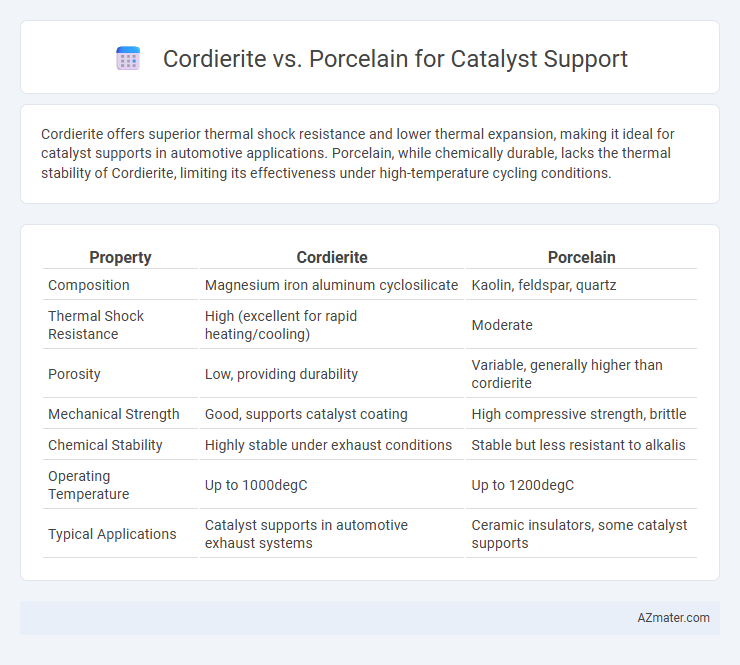Cordierite offers superior thermal shock resistance and lower thermal expansion, making it ideal for catalyst supports in automotive applications. Porcelain, while chemically durable, lacks the thermal stability of Cordierite, limiting its effectiveness under high-temperature cycling conditions.
Table of Comparison
| Property | Cordierite | Porcelain |
|---|---|---|
| Composition | Magnesium iron aluminum cyclosilicate | Kaolin, feldspar, quartz |
| Thermal Shock Resistance | High (excellent for rapid heating/cooling) | Moderate |
| Porosity | Low, providing durability | Variable, generally higher than cordierite |
| Mechanical Strength | Good, supports catalyst coating | High compressive strength, brittle |
| Chemical Stability | Highly stable under exhaust conditions | Stable but less resistant to alkalis |
| Operating Temperature | Up to 1000degC | Up to 1200degC |
| Typical Applications | Catalyst supports in automotive exhaust systems | Ceramic insulators, some catalyst supports |
Introduction to Catalyst Supports
Catalyst supports, commonly used in automotive and industrial applications, enhance the durability and efficiency of catalysts by providing a stable, high-surface-area substrate. Cordierite, a magnesium iron aluminum cyclosilicate ceramic, offers excellent thermal shock resistance and low thermal expansion, making it ideal for high-temperature catalyst supports. Porcelain, composed primarily of kaolin, silica, and feldspar, provides good mechanical strength and chemical stability but generally exhibits higher thermal expansion compared to cordierite, affecting its performance under fluctuating temperatures.
Overview of Cordierite as a Catalyst Support
Cordierite is a preferred catalyst support material known for its excellent thermal shock resistance and mechanical strength in automotive and industrial catalytic converters. Its unique crystal structure provides low thermal expansion and high durability under fluctuating temperatures, preventing cracking and maintaining catalyst integrity. Cordierite's porous and inert nature allows for efficient dispersion of catalytic materials, enhancing overall conversion efficiency while minimizing catalyst attrition.
Overview of Porcelain as a Catalyst Support
Porcelain serves as a catalyst support material recognized for its excellent thermal stability, chemical inertness, and high mechanical strength, making it suitable for harsh reaction environments. Its porous structure facilitates efficient gas flow and maximizes the active surface area for catalytic reactions, enhancing overall performance. Compared to other supports like cordierite, porcelain offers superior resistance to thermal shock and corrosion, extending the lifespan of catalysts in automotive and industrial applications.
Material Composition: Cordierite vs Porcelain
Cordierite is a magnesium iron aluminum cyclosilicate composed mainly of Mg2Al4Si5O18, favored for its low thermal expansion and high thermal shock resistance, making it ideal for catalyst support in automotive applications. Porcelain, typically made from kaolin, feldspar, and quartz, offers high mechanical strength and chemical inertness but has higher thermal expansion and lower thermal shock resistance compared to cordierite. The distinct material compositions of cordierite and porcelain influence their thermal stability and durability, crucial factors in catalyst substrate performance.
Thermal Stability and Resistance Comparison
Cordierite exhibits superior thermal stability with a melting point around 1470degC, making it highly resistant to thermal shock and suitable for high-temperature catalyst support applications. Porcelain, while possessing good mechanical strength, has a lower thermal shock resistance and melting point near 1300degC, which can limit its endurance under rapid temperature fluctuations. Cordierite's low thermal expansion coefficient enhances durability during heating cycles, outperforming porcelain in maintaining structural integrity in catalytic converters.
Mechanical Strength and Durability
Cordierite exhibits superior thermal shock resistance and mechanical strength compared to porcelain, making it ideal for catalyst support in high-temperature applications. Its low thermal expansion coefficient enhances durability by minimizing the risk of cracking under rapid temperature fluctuations. Porcelain, while offering good chemical resistance, tends to be more brittle and less resilient under mechanical stress, reducing its effectiveness as a long-term catalyst support material.
Porosity and Surface Area Advantages
Porcelain catalyst supports exhibit lower porosity compared to cordierite, resulting in less surface area but greater mechanical strength and thermal stability. Cordierite offers higher porosity and surface area, enhancing reactive gas diffusion and catalytic efficiency at elevated temperatures. The choice depends on balancing mechanical durability with catalytic performance needs in exhaust treatment systems.
Chemical Inertness and Compatibility
Cordierite exhibits superior chemical inertness compared to porcelain, making it more resistant to thermal shock and corrosive environments commonly encountered in catalytic converters. The material's thermal expansion coefficient closely matches that of catalytic washcoats, enhancing compatibility and structural integrity under high-temperature cycles. Porcelain, while chemically stable, tends to have higher thermal expansion and lower resistance to chemical attack, limiting its effectiveness as a catalyst support in demanding automotive applications.
Cost-Effectiveness and Availability
Cordierite offers superior cost-effectiveness for catalyst supports due to its lower raw material and manufacturing expenses compared to porcelain. Its widespread availability in industrial markets ensures consistent supply and reduces lead times for production. Porcelain, while durable, tends to be more expensive and less readily available, which can increase overall project costs and procurement challenges.
Applications: Choosing Between Cordierite and Porcelain
Cordierite, known for its excellent thermal shock resistance and lightweight structure, is commonly used in automotive catalytic converters where rapid heating and cooling cycles occur. Porcelain, offering superior chemical stability and mechanical strength, finds applications in industrial catalyst supports exposed to harsh chemical environments and high pressure. Selecting between cordierite and porcelain depends on the specific application requirements such as thermal endurance, chemical resistance, and mechanical durability.

Infographic: Cordierite vs Porcelain for Catalyst Support
 azmater.com
azmater.com